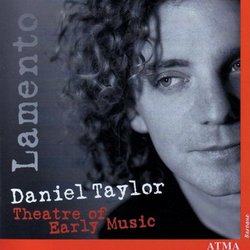| All Artists: Taylor, Theatre of Early Music Title: Lamento Members Wishing: 0 Total Copies: 0 Label: Atma Classique Release Date: 7/9/2002 Genre: Classical Styles: Opera & Classical Vocal, Historical Periods, Early Music Number of Discs: 1 SwapaCD Credits: 1 UPC: 722056226127 |
Search - Taylor, Theatre of Early Music :: Lamento
 | Taylor, Theatre of Early Music Lamento Genre: Classical
|
Larger Image |
CD Details |
CD ReviewsA voice teacher and early music fan George Peabody | Planet Earth | 06/07/2008 (5 out of 5 stars) "IS TAYLOR IMITATING SOMEONE VOCALLY, OR IS IT REALLY HIM?
During the entire 17th century and up until the time of J.S. Bach, German composers were challenged with maintaining and adapting their precious musical heritage, most notably the chorale. Thus between the year 1618-1648 a considerable body of sacred work appeared which forged a family of styles that included learned polyphony, accompanied monody combined with Tuetonic seriousness and Mediterranean abandon. The composers included on this disc were all involved in this music. Heinrich Schutz (1585-1672) was the most important German composer of the 17th century. He preferred giving a dramatic and subjective interpretation of the text. His setting of 'Erbarm dich mein, o Herre Gott' follows the text's beseeching nature, but one can still feel Schutz's madrigalian spirit. Two of Deitrich Buxtehude's (1637-1714)'cantatas' presented here are in fact strophic songs. The elegy (Klag-Lied),on the death of his father in 1647, 'Muss der Tod denn auch entbinden',published that same year, introduces a telling melody of descending intervals depicting moans. A very ingenius instrumental piece built on the chorale 'Mit Fried und Freud' was published along with the Elegy. The aria 'Wenn ich Herr Jesu' is another strophic song expressing here the trust of the believer in his beloved Jesus. In contrast with the foregoing more intimate pieces, the psalm setting (a popular favorite with countertenors) 'Jubilate Domino' is an exalting song of praise. The lamento 'Ach, dass inch Wassers gnug hatte' is by Johann Christoph Bach(1642-1703). This aria da capo is composed on a very sorrowful text borrowed from Psalm 36 and Jeremiah. 'Schlage doch, gewunche Stunde' (another countertenor favorite) previously attributed to J.S. Bach in today ascribed to Georg Melchoir Hoffmann(1685-1715). The two entirely instrumental works recorded here (played skillfully by Theatre of Early Music) are each marked by strong foreign influences, one Italian, the other French. The vocal delivery of Daniel Taylor is rich and fullbodied, making use of not only the head tone but of notes proceding into the chest, but very politely combining with the head tone, thereby providing an unusually wide range of notes, all of which are pleasant to hear. A minimum use of vibrato and an abundance of scholarly interpretion is also obvious to the experienced early music connoisseur. You can't go wrong with this album!!!" |

 Track Listings (14) - Disc #1
Track Listings (14) - Disc #1